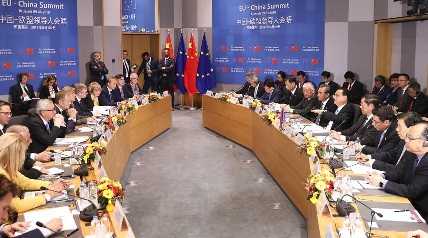
BRUSSELS, Dec. 14 (Xinhua) -- The European Union's (EU) leaders convened here on Thursday and Friday, placing discussions over financial aid for Ukraine, the country's possible accession to the bloc, and the Middle East situation on their top agenda.
"Now is the time for decision-making. I call on you all to come equipped with a spirit of compromise, a sense of collective responsibility, with the Union's interests and values at the forefront of your minds," Charles Michel, president of the European Council, wrote in his invitation letter to the EU leaders.
Michel proposed a 50-billion-euro (54.63 billion U.S. dollars) package to ensure Ukraine's long-term stability. He also stressed that opening accession talks with the country would send a necessary signal.
While this proposal garners support from most member states, Hungary stands in opposition.
"The money for Ukraine in the short term is already in the budget. If we would like to give longer term, and bigger money, we have to manage outside the budget, and we support it," Hungary's Prime Minister Viktor Orban said ahead of the summit.
He also argued against immediate negotiations for Ukraine's membership. "Enlargement is not a theoretical issue. Enlargement is a merit-based, legally detailed process, which has preconditions. We have set up seven preconditions. Even by the evaluation of the commission, three out of the seven are not fulfilled. There is no reason to negotiate membership of Ukraine now," Orban said.
Ukraine and Moldova submitted their application to become member states of the EU in February and March 2022 respectively, and were granted candidate status in June this year.
The situation in the Middle East will also be on the table for the EU leaders. The repercussions of the conflicts in Gaza have manifested in Europe, giving rise to refugee influxes, heightened security threats, and exacerbated social divisions among citizens aligned with different parties in the conflicts.
Last week, the leaders of Belgium, Ireland, Spain and Malta sent a joint letter to European Council President Michel, calling the bloc to agree on imposing targeted travel bans and asset freezes on violent settlers who are attacking and displacing Palestinian settlers in the West Bank.
Highlighting the "death toll, level of destruction and the dire humanitarian situation" in Gaza as "unbearable," the letter stressed the "urgent need" for a political process to implement a two-state solution.




